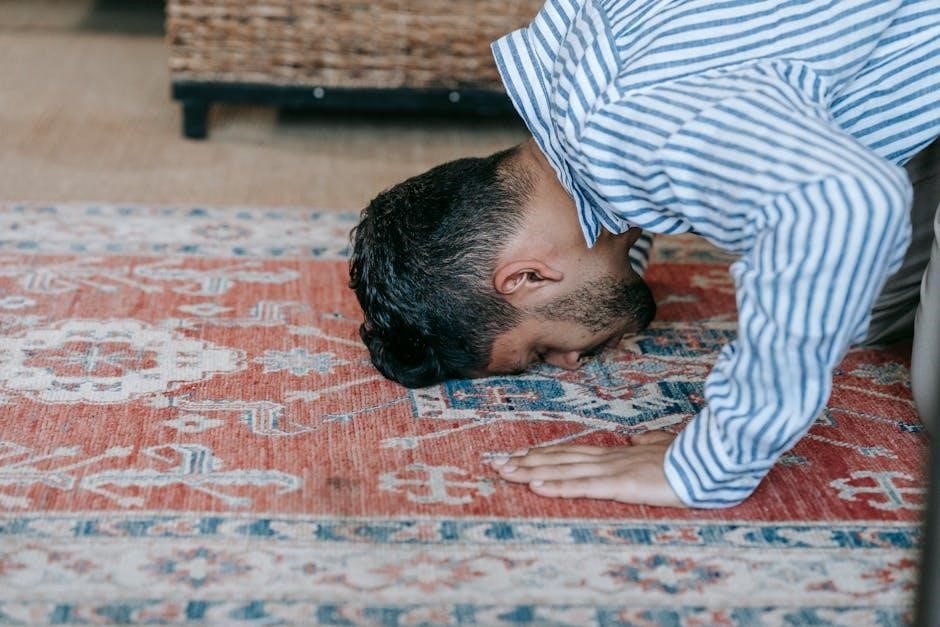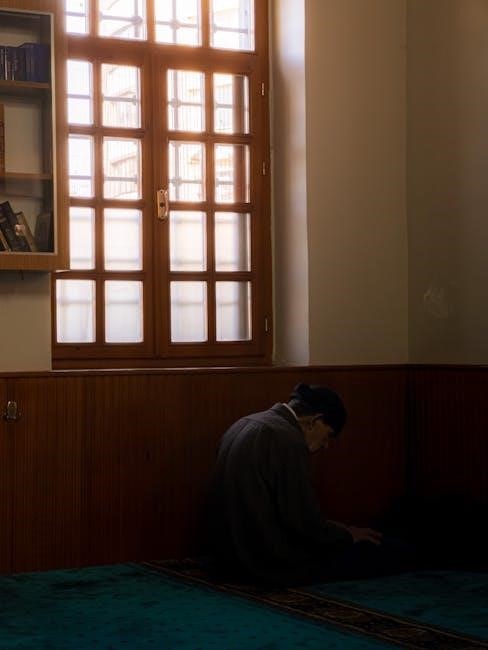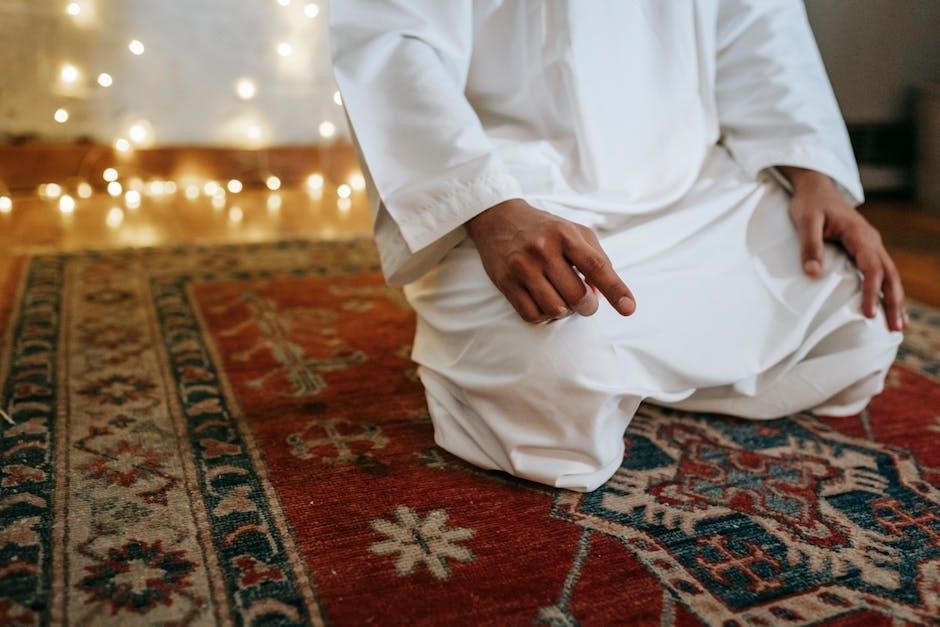
Welcome to this comprehensive guide on dua after salah, a sacred Islamic practice that strengthens one’s connection with Allah. Discover the significance of post-salah supplications, their benefits, and how to incorporate them into your daily routine. This guide also provides access to PDF resources and recommended duas for various life circumstances, ensuring a meaningful and consistent spiritual practice.
Overview of Dua and Salah in Islam
In Islam, Salah (prayer) and Dua (supplication) are integral acts of worship that foster a deep connection with Allah. Salah is the second pillar of Islam, performed five times daily, while Dua is a heartfelt conversation with Allah, expressing gratitude, seeking guidance, and requesting mercy. Together, they embody the essence of submission and devotion. The Quran and Sunnah emphasize the importance of both practices, with the Prophet Muhammad (PBUH) often reciting specific duas after Salah. This combination of obligatory prayer and supplication strengthens faith, purifies the heart, and seeks divine blessings. Understanding their significance and practicing them consistently is vital for a spiritually fulfilling life in Islam.
Importance of Reciting Dua After Salah
Reciting dua after Salah holds immense spiritual significance in Islam. It is a time when the heart is most receptive to divine connection, and supplications are more likely to be accepted. The Prophet Muhammad (PBUH) emphasized the importance of seeking forgiveness and mercy during this sacred moment. Dua after Salah strengthens one’s faith, fosters gratitude, and provides an opportunity to reflect on actions. Consistent practice of post-salah supplications cultivates humility, sincerity, and a deeper bond with Allah. It is also a means of seeking guidance, protection, and blessings, making it a vital component of a Muslim’s spiritual routine. By incorporating recommended duas, believers can enhance their worship and draw closer to Allah, fulfilling the purpose of their creation.
Benefits of Consistency in Reciting Dua After Salah
Consistency in reciting dua after Salah brings numerous spiritual and worldly benefits. Regular supplication strengthens one’s connection with Allah, fostering a deeper sense of gratitude and humility. It enhances spiritual growth, increases faith, and provides stability in life. Consistent practice also earns divine blessings, protection from harm, and guidance in decision-making. The Prophet Muhammad (PBUH) emphasized that regular dua after Salah is a Sunnah that grants believers a higher rank in the hereafter. Additionally, it aids in seeking forgiveness, mercy, and prosperity, while fostering a sense of mindfulness and purpose. By making dua after Salah a habit, one can cultivate a strong, unwavering faith and prepare for the ultimate reward of Paradise.

Popular Duas to Recite After Salah
Discover a collection of widely recited duas after Salah, each tailored for specific blessings, such as forgiveness, protection, guidance, health, wealth, and success in both worlds. These supplications are deeply rooted in Islamic traditions and are recommended for daily practice to seek Allah’s mercy and grace.
Dua for Forgiveness and Mercy
Seeking forgiveness and mercy from Allah is a fundamental aspect of Islamic worship. After Salah, Muslims often recite specific duas to express remorse for their sins and to humbly request Allah’s pardon. One of the most recommended supplications is: “Allahumma ainni alaykadhikrika wa shukrika wa husni ibadatik” (O Allah, help me remember You, thank You, and worship You in the best manner). This dua emphasizes the need for divine guidance and mercy in overcoming life’s challenges. Reciting such supplications consistently fosters a deeper connection with Allah and serves as a means of spiritual purification. Additionally, the Prophet Muhammad (PBUH) encouraged believers to seek forgiveness three times after each Salah, highlighting the importance of humility and repentance in a Muslim’s daily life. These duas are often included in PDF resources for easy reference, ensuring accessibility for those seeking to incorporate them into their worship routines.
Dua for Protection from Harm
Seeking protection from harm is a vital aspect of a Muslim’s supplications after Salah. One of the most highly recommended duas for this purpose is: “A’udhu billahi minash-shaytanir-rajim” (I seek refuge with Allah from Satan, the accursed). Additionally, reciting Surah Al-Nas and Surah Al-Falaq after Salah is encouraged to ward off evil and harm. These duas create a spiritual shield, protecting the believer from negative influences and misfortunes. The Prophet Muhammad (PBUH) emphasized the importance of such supplications, especially after Fajr and Maghrib prayers, when they are most beneficial. Consistently reciting these duas ensures safety, peace, and divine protection in both worldly and spiritual realms. They are often included in PDF guides for easy access and daily remembrance.
Dua for Guidance and Righteousness
Seeking guidance and righteousness is a fundamental aspect of a Muslim’s spiritual journey. One of the most powerful duas for this purpose is: “Allahumma arinil-haqqa haqqan wa arinil-batila batilan” (O Allah, show us truth as truth and falsehood as falsehood). This supplication helps believers discern right from wrong and stay steadfast on the path of righteousness. The Prophet Muhammad (PBUH) often emphasized the importance of such duas in cultivating a strong moral compass. Regularly reciting this dua after Salah fosters a deeper connection with Allah and aligns one’s actions with His will. It is also recommended to recite Surah Al-Furqan and Surah Ash-Sharh for additional guidance and spiritual clarity. These duas are widely available in PDF resources, making them easily accessible for daily recitation and reflection. Consistency in reciting them ensures a steadfast commitment to righteousness and divine guidance.
Dua for Health and Well-being
Maintaining physical and emotional well-being is a blessing from Allah, and seeking His grace through dua is highly recommended. A powerful supplication for health is: “Allahumma izzinaa indaka wa aaffinaa wa ajirnaa minan-naar” (O Allah, honor us with Your nearness, grant us forgiveness, and protect us from the Fire). Reciting this dua after Salah is a way to invoke divine mercy for bodily health and mental peace. The Prophet Muhammad (PBUH) emphasized the importance of such supplications, as they strengthen one’s reliance on Allah. Additionally, Surah Al-Furqan and Dua Al-Ifitah are recommended for overall well-being. These duas are available in PDF resources, making them accessible for daily recitation. Consistent practice ensures a healthy and balanced life, both spiritually and physically.
Dua for Wealth and Prosperity
Seeking wealth and prosperity through dua is a Sunnah practice encouraged in Islam. One of the most recommended supplications is: “Rabbana Aatina Minda Dunya Hasanah, Wa Fil Aakhirati Hasanah, Wa Qina Adhaaban Naar” (Our Lord, give us good in this world and good in the Hereafter, and protect us from the torment of the Fire). Reciting this dua after Salah is a means to invoke Allah’s blessings for financial stability and success. Another powerful dua is: “Allahumma Matti’ni As-Sabr, Wa Yassir Li Amri, Wa Ajma’ Li Rizqan Halaalan” (O Allah, grant me patience, make my affairs easy, and provide me with lawful sustenance). These supplications, found in dua after salah PDFs, emphasize trusting Allah’s provision while striving for righteous earnings. Regular recitation ensures that wealth is acquired and utilized in a way that pleases Him.
Dua for Success in This Life and the Hereafter
Seeking success in both this life and the Hereafter is a noble intention, and Islam encourages believers to supplicate for this through dua. A highly recommended supplication is: “Rabbana Aatina Fid Dunya Hasanah, Wa Fil Aakhirati Hasanah, Wa Qina Adhaaban Naar” (Our Lord, grant us good in this world and good in the Hereafter, and protect us from the torment of the Fire). Reciting this dua after Salah is a powerful means of asking Allah for success in all aspects of life while ensuring spiritual growth. Another dua, “Allahumma Inni Asaluka Al-Huda Wat-Tuqa, Al-Afiyah Wat-Tayyib Al-Rizq” (O Allah, I ask You for guidance, piety, health, and lawful sustenance), further emphasizes the pursuit of righteous success. These supplications, found in dua after salah PDFs, guide believers to align their goals with Allah’s will, ensuring both worldly achievements and eternal bliss.

Dua After Fard Salah
Reciting specific duas after Fard Salah is a Sunnah practice, with Tasbeeh Fatima and supplications like “Allahumma ainni dhikrika” being highly recommended. Consistency in these supplications is rewarded.
Recommended Duas After Each Obligatory Prayer
After each Fard Salah, specific duas are recommended to seek Allah’s blessings and forgiveness. The Prophet Muhammad (PBUH) emphasized the importance of reciting Tasbeeh Fatima, which includes Subhanallah, Alhamdulillah, and Allahu Akbar thirty-three times each. Additionally, supplications like “Allahumma ainni dhikrika wa shukrika wa husni ibadatika” (O Allah, help me remember You, thank You, and worship You beautifully) are highly encouraged. These duas are not only Sunnah but also provide a structured way to connect with Allah after obligatory prayers. They are readily available in PDF resources, making it easy to incorporate them into daily worship. Consistency in reciting these supplications ensures a stronger spiritual practice and a deeper connection with the Almighty.
Dua Recited by the Prophet Muhammad (PBUH) After Salah
The Prophet Muhammad (PBUH) consistently recited specific duas after each obligatory prayer, setting a Sunnah for believers to follow. One such dua is “Allahumma ainni dhikrika wa shukrika wa husni ibadatika” (O Allah, help me remember You, thank You, and worship You in the best of manners). This supplication, narrated by Abu Umamah, reflects the Prophet’s emphasis on gratitude and devotion. Another notable dua is “Allahumma ajirni minan-nar” (O Allah, protect me from the Fire), recited seven times after Fajr. These duas, along with others, are compiled in PDF resources for easy access, allowing Muslims to adopt the Prophet’s blessed practice and strengthen their spiritual connection with Allah. Consistency in reciting these duas is highly rewarded and recommended in the Sunnah.
Special Duas for Fajr and Maghrib Prayers
Fajr and Maghrib prayers hold a special significance in Islam, and specific duas are recommended to be recited after these prayers. After Fajr, the Prophet Muhammad (PBUH) advised reciting “Allahumma ajiurni min an-naar” (O Allah, protect me from the Fire) seven times; This dua is a powerful supplication for seeking divine protection. Similarly, after Maghrib, it is recommended to recite “Allahu Akbar” three times, followed by “La ilaha illallahu wahdahu la sharika lah, lahul mulku wa lahul hamdu, wa huwa ala kulli shayin qadir” (There is no god but Allah alone, with no partner; to Him belongs the dominion and praise, and He is over all things competent). Additionally, reciting Surah Al-Waqi’ah after Maghrib and Fajr is highly encouraged for spiritual growth and blessings. These duas are highlighted in PDF resources for easy access and consistent practice.
Dhikr and Tasbeeh After Salah
Dhikr and Tasbeeh after Salah are essential acts of worship, fostering a deeper connection with Allah. The Prophet (PBUH) emphasized Tasbeeh Fatima (A.S.), involving 33 Subhanallah, 33 Alhamdulillah, and 34 Allahu Akbar. Consistency in these practices is highly rewarded and brings one closer to divine blessings, as detailed in PDF resources.
Significance of Dhikr in Islam
Dhikr, the remembrance of Allah, holds a profound place in Islam, fostering spiritual growth and divine connection. It is an act of worship that brings tranquility to the heart and strengthens faith. The Quran and Sunnah emphasize the importance of engaging in Dhikr, particularly after Salah, as it seeks Allah’s forgiveness, protection, and blessings. The Prophet Muhammad (PBUH) encouraged consistent Dhikr, stating its rewards and its role in purifying the soul. Tasbeeh Fatima (A.S.), involving repetitions of Subhanallah, Alhamdulillah, and Allahu Akbar, is a recommended practice. Regular Dhikr cultivates mindfulness of Allah, guiding believers toward righteous living and eternal success. These sacred words, as detailed in dua after salah PDF resources, are a powerful means of drawing closer to Allah and seeking His mercy in daily life.
Tasbeeh Fatima (A.S.) and Its Rewards
Tasbeeh Fatima (A.S.) is a beautiful practice of remembrance, consisting of reciting Subhanallah, Alhamdulillah, and Allahu Akbar 33 times each, followed by the Duas. This sacred tradition, taught by the Prophet Muhammad (PBUH) to his daughter Fatima (A.S.), is highly recommended in Islam. It is said to bring immense spiritual rewards, including forgiveness of sins and divine mercy. Imam Mohammed Baqir (a.s.) emphasized its significance, stating it as the best invocation after mandatory prayers. The Tasbeeh strengthens one’s connection to Allah, fosters gratitude, and purifies the heart. Its regular recitation, as outlined in dua after salah PDF resources, is a powerful means of seeking Allah’s blessings and living a righteous life, reflecting the Sunnah of the Prophet’s family.
Adhkar Recommended After Each Salah
After each Salah, Muslims are encouraged to engage in specific adhkar (remembrances) to seek Allah’s forgiveness and mercy. These include reciting Subhanallah (33 times), Alhamdulillah (33 times), and Allahu Akbar (33 times), followed by the Duas. Additionally, saying Astaghfirullah (three times) and the Dhikr of Allahumma Antas-Salam wa minkas-salam is highly recommended. These adhkar are rooted in the Sunnah and are supported by authentic hadiths, such as those found in Sahih al-Bukhari and Sahih Muslim. Regular recitation of these adhkar after Salah helps in seeking divine forgiveness, strengthening one’s faith, and cultivating a deeper connection with Allah. Dua after Salah PDF resources provide detailed guidance on these adhkar, ensuring they are recited correctly and consistently, as emphasized in Islamic teachings.

PDF Resources for Dua After Salah
Access comprehensive PDF guides containing essential duas and adhkar for post-salah recitation. These resources, available for free download, include transliterations, translations, and references from the Quran and Sunnah.
Free PDF Downloads of Dua After Salah
Download free PDF resources containing authentic duas and adhkar to recite after salah. These guides include transliterations, translations, and references from the Quran and Sunnah. Popular resources like Tasbeeh Fatima (A.S.) and the dua for forgiveness are featured. Many websites offer formatted PDFs for A4, A5, and A3 paper sizes, making them easy to print and use. These downloads are ideal for creating a structured routine of post-salah supplications. They also provide insights into the benefits of each dua, helping believers deepen their spiritual practice. PDFs are available from trusted sources like duas.org and jamiat.org, ensuring authenticity and ease of access. Whether for personal use or distribution, these resources are invaluable for fostering a meaningful connection with Allah.
Popular Websites Offering Dua PDFs
Several trusted websites provide free dua after salah PDFs for easy download. Duaandazkar.com offers comprehensive guides with categorized sections for different supplications. Duas.org is another reliable source, featuring a wide library of PDFs with Arabic text, transliterations, and translations. Additionally, jamiat.org provides beautifully formatted PDFs specifically for adhkar after salah, including benefits and references. These websites ensure that users can access authentic and well-organized resources to enhance their spiritual practice. They cater to both personal and communal use, making it convenient to incorporate these supplications into daily life. Explore these platforms to find the perfect PDF for your needs, ensuring a consistent and meaningful dua routine after each salah.
How to Use Dua PDFs for Daily Recitation
To effectively use dua after salah PDFs for daily recitation, start by downloading the files from trusted sources like duaandazkar.com or duas.org. Print the PDFs for a physical copy or save them on your device for easy access. Establish a consistent routine by reciting the supplications immediately after each salah, ensuring a dedicated time for spiritual reflection. Many PDFs include transliterations and translations, which can help non-Arabic speakers understand the meanings. Prioritize specific duas based on your needs, such as forgiveness or protection, and recite them with focus and sincerity. For enhanced benefits, memorize key supplications over time. Share the PDFs with others to spread the blessings and encourage communal practice. By following these steps, you can make the most of these resources and deepen your connection with Allah.
How to Perform Dua After Salah Correctly
To perform dua after salah correctly, face the Qiblah, ensure cleanliness, and use recommended supplications from authentic sources. Consistency and sincerity enhance the effectiveness of your prayers.
Etiquettes of Reciting Dua After Salah
Observing proper etiquettes while reciting dua after salah is essential for its acceptance. Ensure you face the Qiblah, remain in the same place where you prayed, and maintain a clean and humble state. Begin with praising Allah and sending blessings upon the Prophet Muhammad (PBUH). Use authentic supplications from the Quran and Sunnah, such as the recommended duas found in PDF resources. Avoid raising your voice unless taught by the Prophet (PBUH). Keep your heart focused and your words sincere. Recite dhikr, such as saying Allahu Akbar three times and seeking forgiveness. These practices enhance the spiritual benefits of your dua and strengthen your connection with Allah.
Best Times to Recite Dua After Salah
The best times to recite dua after salah are moments of heightened spirituality and divine mercy. The Prophet Muhammad (PBUH) emphasized that supplications after Fajr and Maghrib prayers are particularly beneficial, as these times are closer to Allah’s attention. Additionally, the last third of the night is a blessed period for dua, as mentioned in the Sunnah. Consistency in reciting duas after each obligatory prayer ensures a strong spiritual practice. Use PDF resources to learn authentic supplications and their proper timings. Remember, sincerity and focus are key to making your dua effective. By adhering to these recommended times, you can maximize the spiritual rewards of your post-salah supplications and deepen your connection with Allah.
Steps to Make Dua After Salah More Effective
To make dua after salah more effective, ensure you are in a state of sincerity and focus. Begin by praising Allah and expressing gratitude before making your supplication. Use the Prophet Muhammad’s (PBUH) recommended phrases, such as seeking forgiveness and mercy, to align your dua with the Sunnah. Maintain a clean heart by avoiding sin and fostering good deeds; Recite duas with conviction and face the Ka’bah if possible. Avoid distractions and embrace patience, as Allah answers in His perfect timing. Incorporate recommended dhikr and tasbeeh to enhance your spiritual practice. Use PDF resources to guide your recitations and ensure authenticity. By following these steps, you can deepen your connection with Allah and make your post-salah supplications more impactful.
The Role of Dua in Spiritual Growth
Dua plays a vital role in spiritual growth by fostering a deep connection with Allah, seeking forgiveness, and guiding believers toward righteousness. It refines the heart and strengthens faith, enabling Muslims to navigate life’s challenges with humility and reliance on divine mercy. Through consistent and sincere supplication, individuals cultivate a profound sense of closeness to Allah, which is essential for spiritual elevation and inner peace.
Connecting with Allah Through Dua
Dua serves as a profound means of connecting with Allah, fostering a deeply personal and spiritual relationship. It allows believers to communicate directly with their Creator, expressing gratitude, seeking forgiveness, and requesting guidance. Through consistent and sincere supplication, individuals strengthen their bond with Allah, nurturing humility and reliance on His divine mercy. Dua after Salah is particularly significant, as it is recited during a time when the heart is most receptive to spiritual reflection. By engaging in this practice, Muslims demonstrate their trust in Allah’s wisdom and providence, seeking His assistance in navigating life’s challenges. Regular dua cultivates a sense of nearness to Allah, fostering inner peace and a deeper understanding of His will. This connection is essential for spiritual growth and a fulfilling Islamic lifestyle.
Building a Stronger Spiritual Practice with Dua
Reciting dua after Salah is a powerful way to strengthen your spiritual practice, fostering a deeper connection with Allah. Consistency in this practice helps cultivate mindfulness and gratitude, while also seeking divine guidance and protection. By incorporating dua into your daily routine, you establish a structured approach to spiritual growth, ensuring that your heart remains aligned with Allah’s will. The practice of dua after Salah also promotes self-reflection, encouraging believers to evaluate their actions and seek improvement. This consistent communication with Allah strengthens faith, provides emotional solace, and equips individuals to navigate life’s challenges with resilience and trust in His plan. Regularly reciting dua after Salah is thus a cornerstone of a vibrant and meaningful spiritual life.
Overcoming Life’s Challenges with Dua
Reciting dua after Salah serves as a powerful tool for navigating life’s difficulties, offering solace, strength, and divine guidance. Through consistent supplication, believers can seek Allah’s assistance in overcoming hardships, trusting in His wisdom and mercy. Specific duas, such as those for protection, forgiveness, and guidance, provide spiritual armor against life’s trials. For instance, the Dua for Protection from Harm and the Dua for Forgiveness and Mercy are particularly beneficial during challenging times, helping to alleviate burdens and restore peace. By turning to Allah through dua, individuals cultivate resilience, gain clarity, and find comfort in His infinite wisdom. This practice not only addresses immediate concerns but also fosters long-term spiritual growth, enabling believers to face life’s obstacles with faith and confidence.
Leave a Reply
You must be logged in to post a comment.